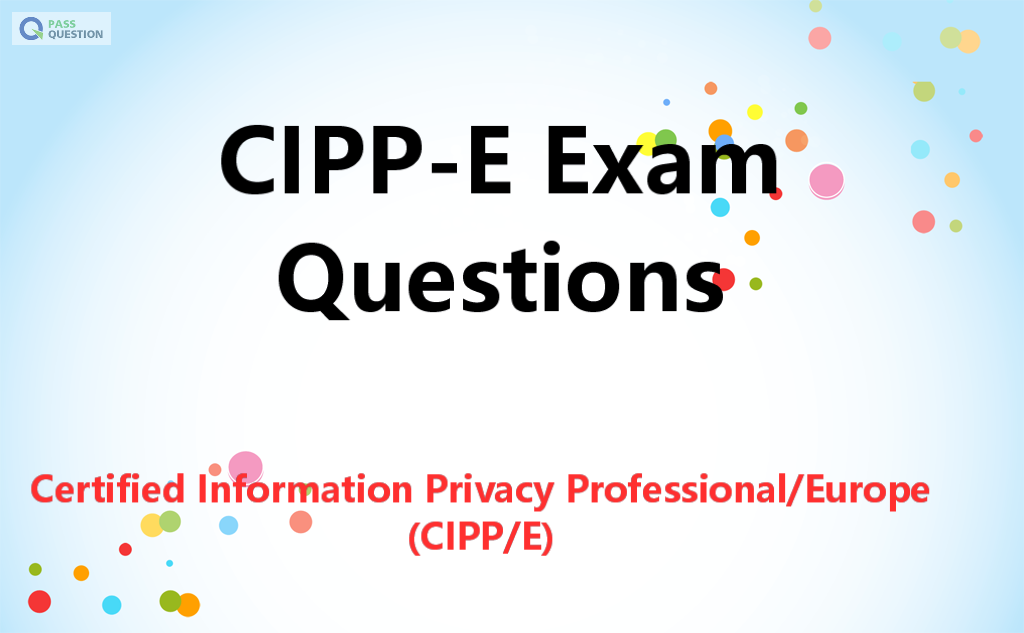CIPP-E Exam Questions - Certified Information Privacy Professional/Europe (CIPP/E)
Want to pass Certified Information Privacy Professional/Europe (CIPP/E) Exam? PassQuestion new updated CIPP-E Exam Questions which have a very close similarity with real exam. PassQuestion can promise that you can 100% pass your first time to attend IAPP certification CIPP-E exam. PassQuestion provides you the high quality CIPP-E Exam Questions, which can let you do simulation test before the real CIPP-E exam. So you can take a best preparation for the exam.

Achieving a CIPP/E credential shows you have the comprehensive GDPR knowledge, perspective and understanding to ensure compliance and data protection success in Europe—and to take advantage of the career opportunity this sweeping legislation represents.
CIPP/E Updates
This year's changes resulted in minimal additions to the CIPP/E Body of Knowledge (BoK). Exam Blueprint changes were made to reflect the BoK updates for the CIPP/E. The number of exam questions did not change.
The following represents updated content:
• Auditing of privacy programs.
• Biometric data and facial recognition.
• Artificial intelligence and data protection.
• The third countries concept.
• Convention 108.
• EDPB Guidelines on the territorial scope of the GDPR.
• Processing of personal data through video devices.
• Roles of the lead supervisory authority.
• Right to be forgotten in search engine cases.
• Data security issues and Article 32
Certified Information Privacy Professional/Europe (CIPP/E) Exam Outline
I. Introduction to European Data Protection
A. Origins and Historical Context of Data Protection Law
B. European Union Institutions
C. Legislative Framework
II. European Data Protection Law and Regulation
A. Data Protection Concepts
B. Territorial and Material Scope of the General Data Protection Regulation
C. Data Processing Principles
D. Lawful Processing Criteria
E. Information Provision Obligations
F. Data Subjects’ Rights
G. Security of Personal Data
H. Accountability Requirements
I. International Data Transfers
J. Supervision and enforcement
K. Consequences for GDPR violations
III.Compliance with European Data Protection Law and Regulation
A. Employment Relationship
B. Surveillance Activities
C. Direct Marketing
D. Internet Technology and Communications
View Online Certified Information Privacy Professional/Europe (CIPP/E) Free Questions
1.Which statement is correct when considering the right to privacy under Article 8 of the European Convention on Human Rights (ECHR)?
A. The right to privacy is an absolute right
B. The right to privacy has to be balanced against other rights under the ECHR
C. The right to freedom of expression under Article 10 of the ECHR will always override the right to privacy
D. The right to privacy protects the right to hold opinions and to receive and impart ideas without interference
Answer: B
2.What is one major goal that the OECD Guidelines, Convention 108 and the Data Protection Directive (Directive 95/46/EC) all had in common but largely failed to achieve in Europe?
A. The establishment of a list of legitimate data processing criteria
B. The creation of legally binding data protection principles
C. The synchronization of approaches to data protection
D. The restriction of cross-border data flow
Answer: A
3.A key component of the OECD Guidelines is the “Individual Participation Principle”.
What parts of the General Data Protection Regulation (GDPR) provide the closest equivalent to that principle?
A. The lawful processing criteria stipulated by Articles 6 to 9
B. The information requirements set out in Articles 13 and 14
C. The breach notification requirements specified in Articles 33 and 34
D. The rights granted to data subjects under Articles 12 to 22
Answer: D
4.Which EU institution is vested with the competence to propose new data protection legislation on its own initiative?
A. The European Council
B. The European Parliament
C. The European Commission
D. The Council of the European Union
Answer: C
5.What is an important difference between the European Court of Human Rights (ECHR) and the Court of Justice of the European Union (CJEU) in relation to their roles and functions?
A. ECHR can rule on issues concerning privacy as a fundamental right, while the CJEU cannot.
B. CJEU can force national governments to implement and honor EU law, while the ECHR cannot.
C. CJEU can hear appeals on human rights decisions made by national courts, while the ECHR cannot.
D. ECHR can enforce human rights laws against governments that fail to implement them, while the CJEU cannot.
Answer: C
- TOP 50 Exam Questions
-
Exam
All copyrights reserved 2025 PassQuestion NETWORK CO.,LIMITED. All Rights Reserved.

